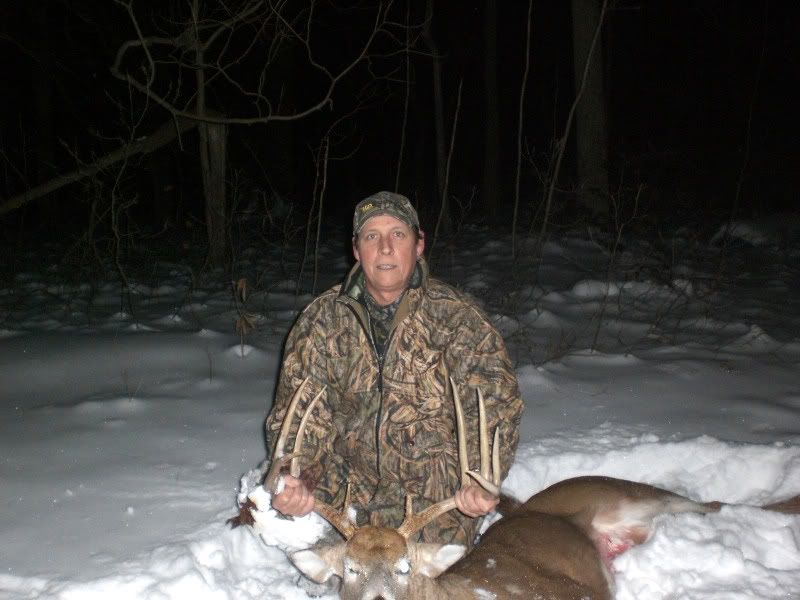Post by eshoremd on Oct 6, 2006 9:34:20 GMT -5
Organization connects hunters and farmers with the Maryland Food Bank
BALTIMORE - Maryland has two problems that are typical of what other states face: poor residents who need help feeding their families, and too many deer.
Long-time teacher and bow hunter Rick Wilson hadn’t yet put two and two together until 1997, when a roadside stop to aid a woman with a disabled vehicle changed his life. Turns out, the woman’s car was fine, she just needed help loading roadkill into her trunk.
When he cautioned it was illegal to transport an untagged deer, she told him that she and her kids were so hungry she didn’t care.
From that jarring awakening, Wilson began a venison donation program through his church in Hagerstown. That first year, two tons of meat were donated to feed the hungry.
In 2005, through Wilson’s Farmers and Hunters Feeding the Hungry, 64 tons — or 512,000 servings — of deer were processed. This year’s hunt (deer bow season starts Sept. 15) is expected to see even higher numbers.
The Maryland Food Bank receives about 15 tons a year from FHFH.
“What they give us is something we don’t get enough of — meat,” said Bill Ewing, Food Bank executive director and a member of FHFH’s advisory committee. “Meat is expensive. But [venison] has good nutritional value — it’s lowfat and high protein.”
With an outlet for their kills besides their own freezer, some hunters are increasing the number of deer they bag, pleasing state wildlife management officials.
“I can’t eat all I can shoot, but I can donate them to Farmers and Hunters Feeding the Hungry,” explained Baltimore County hunter John Svitil.
What really boosted FHFH was a Maryland decision in 1999 to give hunters the option to donate $1 to the Williamsport nonprofit when they bought their hunting license. Many did, donating $43,500 that year.
In 2002, the state made the $1 contribution mandatory. With 100,000 hunters in the state, this means $100,000 goes to FHFH. This cash — and another $85,000 raised from churches and corporations — is essential for paying processing costs.
“Maryland has become the model for the rest of the country,” said C.J. Winand, FHFH director of national promotions.
FHFH has 85 chapters in 30 states, but most struggle without the $1 license fee.
Winand is lobbying other states to adopt the fee. He is also pursuing the federal government.
Winand is meeting with Congressional Sportsmen’s Caucus member Roscoe Bartlett this month to ask for the insertion of one-for-one matching dollars into the 2007 Farm Bill.
BALTIMORE - Maryland has two problems that are typical of what other states face: poor residents who need help feeding their families, and too many deer.
Long-time teacher and bow hunter Rick Wilson hadn’t yet put two and two together until 1997, when a roadside stop to aid a woman with a disabled vehicle changed his life. Turns out, the woman’s car was fine, she just needed help loading roadkill into her trunk.
When he cautioned it was illegal to transport an untagged deer, she told him that she and her kids were so hungry she didn’t care.
From that jarring awakening, Wilson began a venison donation program through his church in Hagerstown. That first year, two tons of meat were donated to feed the hungry.
In 2005, through Wilson’s Farmers and Hunters Feeding the Hungry, 64 tons — or 512,000 servings — of deer were processed. This year’s hunt (deer bow season starts Sept. 15) is expected to see even higher numbers.
The Maryland Food Bank receives about 15 tons a year from FHFH.
“What they give us is something we don’t get enough of — meat,” said Bill Ewing, Food Bank executive director and a member of FHFH’s advisory committee. “Meat is expensive. But [venison] has good nutritional value — it’s lowfat and high protein.”
With an outlet for their kills besides their own freezer, some hunters are increasing the number of deer they bag, pleasing state wildlife management officials.
“I can’t eat all I can shoot, but I can donate them to Farmers and Hunters Feeding the Hungry,” explained Baltimore County hunter John Svitil.
What really boosted FHFH was a Maryland decision in 1999 to give hunters the option to donate $1 to the Williamsport nonprofit when they bought their hunting license. Many did, donating $43,500 that year.
In 2002, the state made the $1 contribution mandatory. With 100,000 hunters in the state, this means $100,000 goes to FHFH. This cash — and another $85,000 raised from churches and corporations — is essential for paying processing costs.
“Maryland has become the model for the rest of the country,” said C.J. Winand, FHFH director of national promotions.
FHFH has 85 chapters in 30 states, but most struggle without the $1 license fee.
Winand is lobbying other states to adopt the fee. He is also pursuing the federal government.
Winand is meeting with Congressional Sportsmen’s Caucus member Roscoe Bartlett this month to ask for the insertion of one-for-one matching dollars into the 2007 Farm Bill.




 .
.